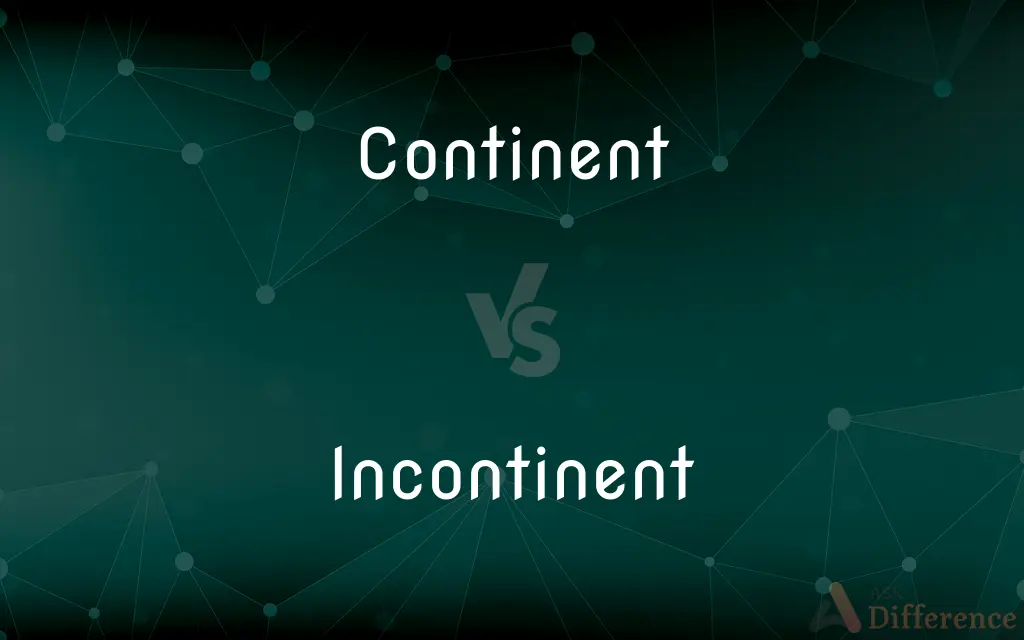Continent vs. Incontinent — What's the Difference?
By Urooj Arif & Fiza Rafique — Updated on April 29, 2024
Continent refers to a large, continuous mass of land, whereas incontinent refers to the inability to control urination or defecation.

Difference Between Continent and Incontinent
Table of Contents
ADVERTISEMENT
Key Differences
A continent is one of several large landmasses on Earth, such as Africa or Asia, recognized for its geographical and geopolitical significance. In contrast, incontinent is a medical term describing the lack of voluntary control over urination or defecation, often related to underlying health issues.
Continents are defined by convention rather than strict criteria, primarily distinguished by geographical boundaries and cultural regions. On the other hand, incontinence can be categorized into several types, including stress, urge, and functional, each with distinct causes and management strategies.
The concept of a continent is integral to the field of geography, influencing aspects of climate, biodiversity, and human culture. Whereas, incontinence primarily concerns health professionals, affecting individual quality of life and requiring medical attention.
Continents have been central to human history, facilitating migrations, conquests, and the spread of civilizations. In contrast, incontinence, while a personal health issue, has broader implications for public health and elder care.
The study of continents involves various disciplines including geology, ecology, and anthropology, focusing on the physical and cultural landscapes. Meanwhile, incontinence is studied within medical and psychological fields, focusing on causes, prevention, and treatments.
ADVERTISEMENT
Comparison Chart
Definition
Large, continuous mass of land
Inability to control urination or defecation
Relevance
Geographical, cultural
Medical, health
Key Disciplines
Geography, ecology
Medicine, psychology
Global Impact
Climate, biodiversity, politics
Quality of life, health care
Typical Context
Maps, travel, international relations
Health discussions, elder care
Compare with Definitions
Continent
Historically, parts of the world known to Europeans before the discovery of the Americas.
In historical contexts, the Continent often refers to mainland Europe.
Incontinent
A term used in medical assessments and care planning.
Incontinence is a significant factor in assessing eldercare needs.
Continent
One of the main landmasses of the globe, traditionally counted as seven.
Australia is often referred to as both a country and a continent.
Incontinent
Often associated with aging or neurological disorders.
Multiple sclerosis can lead to incontinent symptoms.
Continent
A region considered in terms of its physical features and environmental conditions.
The continent of Antarctica is known for its harsh, icy landscape.
Incontinent
Lacking control over urinary or bowel functions.
Incontinent patients often require specialized care.
Continent
A large scale geographical division distinguishing different areas of the Earth.
The continent of Europe is culturally and politically diverse.
Incontinent
Manageable through various treatments like medication or surgery.
Doctors may recommend pelvic exercises for incontinent issues.
Continent
Major expanse of land covering a significant part of the earth's surface.
Asia is the largest continent by both area and population.
Incontinent
Medical condition involving involuntary excretion.
Geriatric medicine frequently addresses incontinence.
Continent
A continent is one of several large landmasses. Generally identified by convention rather than any strict criteria, up to seven regions are commonly regarded as continents.
Incontinent
Not restrained; uncontrolled
Incontinent rage.
Continent
One of the principal land masses of the earth, usually regarded as including Africa, Antarctica, Asia, Australia, Europe, North America, and South America.
Incontinent
Lacking normal voluntary control of excretory functions.
Continent
Continent The mainland of Europe. Used with the.
Incontinent
(often followed by of) Unable to contain or retain.
Continent
Exercising continence.
Incontinent
Plagued by incontinence; unable to retain natural discharges or evacuations of urine or feces.
Continent
Each of the main continuous land-masses on the earth's surface, now generally regarded as seven in number, including their related islands, continental shelves etc.
Incontinent
Unrestrained or unceasing.
An incontinent river of pure water
Continent
A large contiguous landmass considered independent of its islands, peninsulas etc. Specifically, the Old World continent of Europe–Asia–Africa. See the Continent.
Incontinent
(colloquial) Immediate; without delay.
Continent
(obsolete) Land (as opposed to the water).
Incontinent
(obsolete) Immediately, forthwith.
Continent
Not interrupted; connected; continuous.
A continent fever
Incontinent
(obsolete) One who is unchaste.
Continent
(obsolete) Serving to restrain or limit; restraining; opposing.
Incontinent
Unable to restrain natural evacuations, such as urination or defecation.
Continent
Serving to restrain or limit; restraining; opposing.
Incontinent
One who is unchaste.
Continent
Exercising restraint as to the indulgence of desires or passions; temperate; moderate.
Have a continent forbearance till the speed of his rage goes slower.
Incontinent
Incontinently; instantly; immediately.
He says he will return incontinent.
Continent
Not interrupted; connected; continuous; as, a continent fever.
The northeast part of Asia is, if not continent with the west side of America, yet certainly it is the least disoined by sea of all that coast.
Incontinent
Not having control over urination and defecation
Continent
That which contains anything; a receptacle.
The smaller continent which we call a pipkin.
Continent
One of the grand divisions of land on the globe; the main land; specifically (Phys. Geog.), a large body of land differing from an island, not merely in its size, but in its structure, which is that of a large basin bordered by mountain chains; as, the continent of North America.
Continent
One of the large landmasses of the earth;
There are seven continents
Pioneers had to cross the continent on foot
Continent
The European mainland;
Englishmen like to visit the Continent but they wouldn't like to live there
Continent
Having control over urination and defecation
Common Curiosities
Can incontinence be cured?
Depending on the cause, incontinence can often be treated effectively with medical intervention and lifestyle adjustments.
How many continents are there?
There are conventionally seven continents: Africa, Antarctica, Asia, Europe, North America, Australia, and South America.
What causes incontinence?
Incontinence can be caused by various factors, including aging, underlying medical conditions, or physical problems affecting the bladder or bowels.
What is a continent?
A continent is a large, continuous, discrete mass of land, ideally separated by expanses of water.
Are continents evenly distributed across the globe?
No, continents are not evenly distributed and vary greatly in size and shape.
What role do continents play in biodiversity?
Continents play a critical role in biodiversity, providing varied habitats that support a wide range of flora and fauna.
What is the smallest continent?
Australia is considered the smallest continent.
What types of incontinence are there?
The main types of incontinence are stress, urge, overflow, and functional incontinence.
How is incontinence diagnosed?
Incontinence is diagnosed through medical history, physical examinations, and sometimes testing.
How is a continent different from an island?
A continent is much larger than an island and is usually identified by convention rather than strict geographical criteria.
Share Your Discovery

Previous Comparison
Sardine vs. Sild
Next Comparison
Context vs. PerspectiveAuthor Spotlight
Written by
Urooj ArifUrooj is a skilled content writer at Ask Difference, known for her exceptional ability to simplify complex topics into engaging and informative content. With a passion for research and a flair for clear, concise writing, she consistently delivers articles that resonate with our diverse audience.
Co-written by
Fiza RafiqueFiza Rafique is a skilled content writer at AskDifference.com, where she meticulously refines and enhances written pieces. Drawing from her vast editorial expertise, Fiza ensures clarity, accuracy, and precision in every article. Passionate about language, she continually seeks to elevate the quality of content for readers worldwide.














































